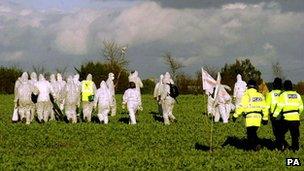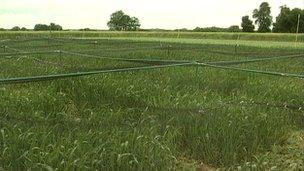Calls for a mood change on GM foods
- Published
- comments

GM protesters undertook a high profile campaign over a decade ago
Thirteen years ago 28 supporters of Greenpeace, external broke into a field near Norwich and trashed the crop of genetically modified wheat.
It marked the start of a high profile campaign which forced the government to back down and brought an end to much of the research into the new technology.
Since then we've heard very little about the subject, but could all that be about to change?
This week the MP for Mid Norfolk, George Freeman, external, used a speech to a farming conference in Norfolk to call for a new debate into the benefits of GM.
"The public mood is changing," he told them.
"We need a grown-up debate about GM - we need to look at how we can unlock the power of that science to help the rest of the world.
"And we in government need to do more to support this important sector."
Food production
Mr Freeman is a great supporter of new technologies and bio science.
He is a government advisor on life sciences and chair of the Science and Technology Select Committee, external, and he feels farming and local research is losing out.
"GM is taking off around the world whether we like it or not," he later told us.
"The choice is whether we are a bystander or whether we take part in it."
"At a time when the world is crying out for ways of growing more food, it would be negligent for us not to look at our science base in Norwich and Cambridge, and look at how we can grow food for the rest of the world.
"If we are going to increase food production then innovations like the blight resistant potato bred here in Norfolk and using traditional strains and varieties and gene traits, have a huge role to play."
Future crops
The Norfolk farming conference was dominated by talk about coping with the drought and the need to increase food production.
The conference was told that the world demand for food will have increased by 50% by 2030.
"We are not developing the crops we need for the future," said Peter Kendall, the President of the National Farmers' Union, external.
"We need to develop crops which will help us manage with less water and crops which don't need to be sprayed for insects.
"The resilience we need for the future will be delivered by smart plant breeding - and that's all GM is."

MP George Freeman has called for a grown-up debate on GM crops
The present government is more pro-GM than the previous one but even though it is not the issue it used to be, we understand that there is still some reluctance within Downing Street to give the go ahead to the full scale use of GM.
Advisors still fear the public reaction.
"I think there are still a lot of people who say, 'We do not want GM food, it's bad for our environment and it's potentially dangerous'," says Rupert Read, the leader of the Green Party in the Eastern Region, external.
"What worries us is that GM is not about feeding the world, it's about making money for a few big corporations.
"British farmers would be in a much better situation if there was more research into organic farming or into how to make small scale farming more successful."
Mr Freeman says he isn't forcing GM on people who don't want it, he just wants there to be a choice for those who do.
And he admits there is still a long way to go to win over public opinion, but he and other MPs believe the tide is turning.